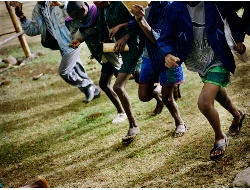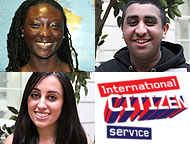"What's an Ethiopian?" cried a 14-year-old girl during a boisterous lunch break at my Surrey school. I remember it well: my friends and I ridiculed her, yet, at that stage, none of us knew much about what being an Ethiopian meant.

Unfortunately, I'd say that's still the case. When talking about my travels, many stereotypes emerged: "Talented long-distance runners"; "Some of the world's earliest Christians"; but, commonest of all? - "Famine-stricken". When animatedly discussing our various destinations at my ICS training weekend, one girl in the group who was heading to Nepal exclaimed, "They’re sending you to Ethiopia?! Aren't people, like, starving over there?"
Well, yes, many are. Perhaps Bob Geldof’s charitable efforts in the 80s have left Ethiopia with an enduring image of vulnerability.
It is these kind of uninformed, blurry impressions about developing countries that could be changed by ICS. I personally think that it's only by living in these states that it is possible to truly appreciate that they are not 'lost causes'; that they in fact have a rich history and a fascinating culture, often coupled with a far more positive outlook than that held by many prosperous westerners.
I experienced this African optimism, and a communal way of life, when I volunteered for a month in Tanzanian schools last summer. Strangers would greet me in public in the most welcoming way; if this occurred on London's streets, the greeter would probably be considered bad or mad. The prospect of being amidst this refreshing warmth and generosity again is at the forefront of my mind as I make my final frantic preparations for departure, and was a significant factor in my decision to apply to ICS.
Yet familial and communal bonds must be stronger in developing countries: it is your family and friends, not the state, who provide vital support during times of need. Although the Ethiopian economy is currently one of the fastest growing in the world, the establishment of an effective welfare state is still a distant hope.
Despite the serious challenges posed by life in Ethiopia, I know my time there will be both rewarding and unforgettable. With a week to go, I'm still not entirely sure what to expect: although my experiences in Tanzania have given me an impression, no two developing countries or altruistic projects are the same. VSO has only given its teams a few lines about their respective projects, and told us that we will be staying with a host family: the rest, they say, will become clear once we arrive.
There's only so much that can be planned in advance, anyway: the course the project takes depends on the relationships we build with the locals. I imagine there will be much trial and error, times when we feel overworked, and times when we feel useless. But what I hope guides us through any doubt or struggle is an overarching sense that we are making a serious effort to improve the lives of those less fortunate than us. Bring on Addis Ababa.

Ceri, Esi and Mohammed volunteered through ICS last year. Hear them talk about their experiences in Ethiopia, Uganda and Kenya in the latest DFID podcast.

6 comments
Comment by mnnnn posted on
Good job and observation. I would be happy if we can talk more of these issues!
Comment by Jennifer poemas posted on
Hi, really would like to congratulate you for the inquiry, and the article truly African countries are those who most need the help of the world ...
greetings ...
Comment by Funwako Dlamini posted on
I am Swazi by birth and living in Swaziland in Southern Africa. Your mission to explore Africa will help our fellow brothers and sisters living in the first world & other developing coutries with negative attitudes towards other countries. Life in Africa may be both tough and interesting at the same time.
I once attended a course in Ethiopia. The course was in Nazareth which is about 100km east of Addis Ababa. I also went for a week practicals to a small town called Mettahara on the way to Djiboute & Somalia. What I want to share with you is that it is part of Ethiopia where there is famine. It is the dry area towards Somalia which is semi-desert. In areas like Nazareth and Addis, there is abudant food and meat. Life is so cheaper and interesting. I noticed that the rate of crime was far lower than in my country. But when visiting such countries you need to prepare mentally yourself for surprises and shocks in terms of disparities in the type of food, culture you may be used to etc. Otherwise there is life in Ethiopia. It was not like what I read about that wonderful country with hospitable people. You will not regret to visit Ethiopia. Go for it my sister
Comment by Sonja Woods posted on
Funwako, did you attend Howard University?
Comment by Funwako Dlamini posted on
I have a colleague who studied in Leeds, UK. He told me a shocking but interesting story about his British friend who was also a classmate. He said that he was so kind to an extent that he took his time lecturing him about traffic lights when to stop and cross the road. He did not know that in Africa we have traffic lights like in the UK.
He further told me that there was a time when he asked him as to how and where he learnt English. My colleague in response said that he learnt English at the airport. He further told him that he was kept at the airport for two weeks being taught English language and culture. He never disagreed with him because he knew Africa as a jungle. But with time the English guy came to senses to realise that it was not possible for my colleague to learn and master English within a short space of time. He went behind him to research about Swaziland and discovered that it was a monarchy country, former British protectorate, member of the Commonwealth and English was a language of instruction in schools as well as one of the official languages. After his research he came to my colleague and accused him of fooling him about learning English at Heathrow Airport. He told him about his findings about Swaziland. My colleague just told him that he was just pulling his leg that he learnt English at the airport. He was not aware that an University student was so ignorant about Africa.
Your mission to visit Africa may appear as a useless excercise but I support it, to assist other people that we no loger have people lving in the forest. Yes there are still few tribes living in the forest like Sans in some parts of Botswana, Namibia and South Africa. Go and dig the truth about Africa and share your findings with others.
Comment by Roz McGregor posted on
Hi all,
Sorry I've taken a very long time to respond to these comments! I'm back in the UK now, missing Ethiopia a lot.
Mnnn - thanks for your comment! I would be happy to talk further about these issues too, so feel free to get in touch.
Jennifer - thank you very much for your kind comment.
Funwako - you were right, I have never regretted visiting Ethiopia! It was a fascinating country, and I made some lifelong friendships there. Thanks very much for your thoughts on my trip.